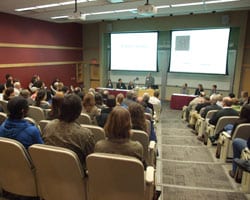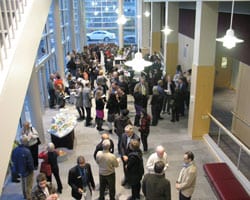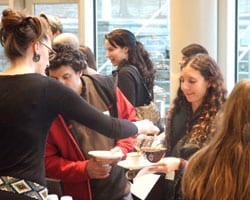News
Gene to Bean to Global Scene
Was held on Tuesday, November 12, 2013 at the Beck Center, Cornell School of Hotel Administration.
Six researchers from the Boyce Thompson Institute for Plant Research and Cornell University’s Lab of Ornithology, Dyson School of Applied Economics and Management,School of Hotel Administration, and College of Agriculture and Life Sciences investigated the culture of coffee, including: consumer tastes and choices, the social impact of development and production, the ecological impacts of coffee farms, and how knowledge of the plant’s genome sequence can provide insight into this popular beverage.
The Scientists
Susan R. Strickler, Ph.D.
Suzy is a bioinformatics postdoctoral researcher in the Mueller Laboratory at the Boyce Thompson Institute for Plant Research. She earned her Ph.D. in genetics from Cornell University in 2010. Her research includes population genetics, comparative genomics, and how evolutionary questions can be addressed through next generation sequencing data.
Her perspective
Like the exquisite flavor of coffee, the genome of the coffee plant Coffea arabica is complex and intriguing. The genomes of the two parents of coffee have combined to form arabica, doubling the number of chromosomes in the process and making it a challenge to sequence. Luckily, new techniques will assist in making arabica sequencing possible. The goal of the sequencing project is to produce a high quality coffee genome sequence, and develop tools that will make the finished genome accessible and useful to breeders and researchers. The genome sequencing will enable assessment of the genetic diversity within the species, and assist breeders in making informed decisions in their breeding programs. Since coffee is victim to a number of diseases and environmental stresses, the advancement of breeding is critical. The project will also generate draft quality genomes of the putative parents of coffee, allowing further insight into the origin of the coffee we drink today.
Lukas Mueller, Ph.D.
Lukas is an Assistant Professor at Boyce Thompson Institute for Plant Science and holds an adjunct position. He received his Ph.D. from the Universite de Lausanne in Switzerland. His research group maintains several genomics databases, including the Solanaceae Genomics Network (SGN, http://solgenomics.net), and is working on several genome sequencing projects, addressing questions in genome structure and evolution.
His perspective
Like the exquisite flavor of coffee, the genome of the coffee plant Coffea arabica is complex and intriguing. The genomes of the two parents of coffee have combined to form arabica, doubling the number of chromosomes in the process and making it a challenge to sequence. Luckily, new techniques will assist in making arabica sequencing possible. The goal of the sequencing project is to produce a high quality coffee genome sequence, and develop tools that will make the finished genome accessible and useful to breeders and researchers. The genome sequencing will enable assessment of the genetic diversity within the species, and assist breeders in making informed decisions in their breeding programs. Since coffee is victim to a number of diseases and environmental stresses, the advancement of breeding is critical. The project will also generate draft quality genomes of the putative parents of coffee, allowing further insight into the origin of the coffee we drink today.
Colleen Anunu
Colleen Anunu is the Director of Coffee for Ithaca, NY based Gimme Coffee, Roast Magazine’s 2013 Roaster of the Year. In this role, Colleen is responsible for coffee quality from seed to cup. Her work with both Gimme and the Coffee Quality Institute has allowed her to focus on improving quality coffee and equity (which are interconnected) throughout the supply chain, and around the globe. She is currently a Master’s candidate in International Development in the College of Agriculture and Life Sciences.
Her perspective
When produced and processed correctly, the Arabica species is coveted by the global Specialty coffee sector for its high level of perceivable acidities, cup cleanliness, and unique flavor attributes reflecting terroir. Through vertical integration and strengthened value chains, coffee producers have the opportunity to gain considerable price premiums for their increased quality of product. Still, the stress intolerance of the Arabica species and many of its hybridized varieties pose a substantial threat to the future of its production. The 2013 Coffee Leaf Rust outbreak in Central America is a powerful example of how increasing environmental fluctuation can affect over 50% of a region’s annual crop in the blink of an eye, creating immediate and lasting effects on the income of individual farmers, the economies of producing countries, and the price stability for the entire global consuming market. Following the coffee tasting, Colleen will discuss the importance of collaboration between breeders, governments and industry in order to make a collective impact on the future supply of coffee.
Miguel Gomez, Ph.D. (Not able to attend due to international travel but actively involved in planning. His colleague, Juan Nicolas Hemandez-Aguilera, see below, spoke on November 12 2013)
Miguel is the Ruth and William Morgan Assistant Professor at Cornell University’s Charles H. Dyson School of Management.
His perspective
The livelihood of a large number of smallholder farmers in developing countries, depends on global coffee value chains. Recent dramatic changes in the coffee market are impacting farmers. Governments have little influence on global coffee markets. The competition has increased, and the product is becoming increasingly differentiated resembling the market for wine. Among these market changes, an important question is, can smallholder farmers benefit from participating in high-value specialty coffee supply chains? Dr. Gomez will discuss the socioeconomic and environmental implications of the Relationship Coffee Model (RCM), a type of specialty coffee marketing where roasters and smallholder farmers work together to establish a direct, long-term trading partnership for coffees that have high quality cup profiles. He will share preliminary findings of such impacts focusing on a field study in two Colombian coffee regions: Cauca and Antioquia.
Read more about Miguel’s work in Cornell Chronicle article from July 2013: http://www.news.cornell.edu/stories/2013/07/grounds-study-seeks-sustainable-java
Juan Nicolas Hernandez-Aguilera
Juan Nicolás Hernández-Aguilera is a PhD student in the Applied Economics Program at Cornell University and his research is focused on sustainable agricultural value chains. Currently, he is evaluating the welfare Impact of the relationship coffee model on small growers from Colombia. Juan Nicolás is a Fulbright scholar from Colombia who has a Masters in Public Administration with emphasis in Development Planning and Environmental Sustainability from University of Pittsburgh and a Masters in Economics from Universidad de los Andes, Colombia.
Kathryn LaTour, Ph.D.
Kathy is an associate professor of services marketing at Cornell University Hotel School. She is an expert in the area of marketing hedonic experiences, with a particular focus on wine and coffee. She received her Ph.D. from the University of Iowa in 1997 and served as a visiting scholar in the Mind of the Market Lab at the Harvard Business School from 1997-2001. Her research takes a consumer psychological perspective toward how marketers should approach branding, experience design, communications, and loyalty programs. She uses both experimental designs and in-depth interview techniques to better understand consumer behavior, fusing macro cultural and micro psychological dimensions to her research. Her major research focus has been on the complexity of human memory.
Her perspective
Kathy will explore consumer experience with artisanal products such as coffee and wine and how directed learning, via a tool such as a wine aroma wheel or a detailed cupping process enhances consumer learning, enjoyment, and choices. Her current research finds that providing consumers with a consumption vocabulary enhances memory accuracy and consumers’ appreciation of the product when they have access to learning opportunities-and are then willing to pay more for these products. She will apply this knowledge to look at different aspects of the coffee experience-from consumers’ experience with it (via tasting), to agricultural aspect (economic) to the eco-culture (birds) to the genetic makeup.
Amanda Rodewald, Ph.D.
Amanda is the Director of Conservation Science at the Cornell Lab of Ornithology, an Associate Professor in the Department of Natural Resources, and a Robert F. Schumann Faculty Fellow. She received her Ph. D. in Ecology from Pennsylvania State University in 2000 and then spent 13 years as a Professor of Wildlife Ecology at Ohio State University before joining Cornell University in February. Amanda and her students study how human activities influence ecosystems and the services they provide and then apply that understanding to conservation. The heart of her research program lies in avian ecology and conservation, and she works in systems ranging from coffee-growing regions in the northern Andes of South America to forested landscapes in eastern North America to Midwestern cities.
Her perspective
Because the coffee-growing regions of Central and South America are hotspots for biodiversity, a priority is to identify ways that agriculture can be sustainably used to meet both human and environmental needs. Shade-coffee farming stands out as one of the most sustainable agricultural practices because it provides a variety of products, such as coffee and fruit, and at the same time maintains forest cover, supports biodiversity, requires minimal chemicals, and reduces erosion compared to other intensive agricultural systems. Perhaps no other group better highlights the positive role that shade-coffee plays in conservation than Neotropical migratory birds, which heavily use shade-coffee farms. She will discuss how shade-coffee and other agroforestry practices can support bird conservation, ecosystem protection, and ultimately human communities in Latin America. Watch this blog post from Cornell Lab of Ornithology with video of Amanda’s talk.
Event made possible by:
Gimme!Coffee
Wegmans
Cornell BTI
Cornell Lab of Ornithology
Cornell University





